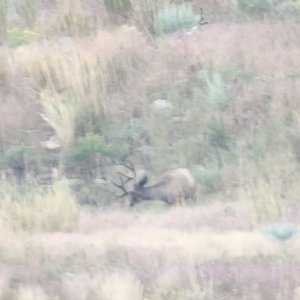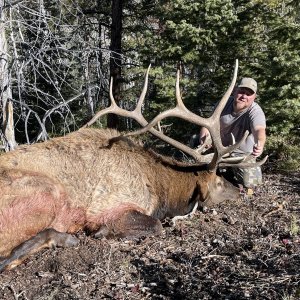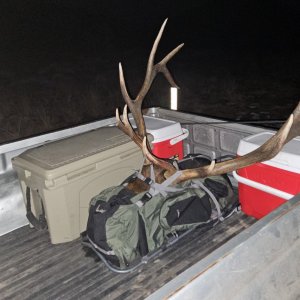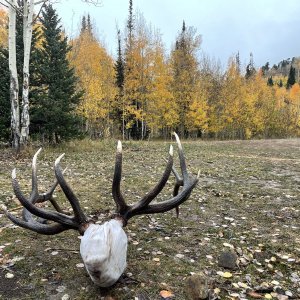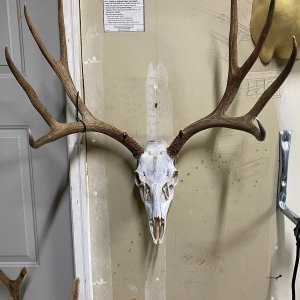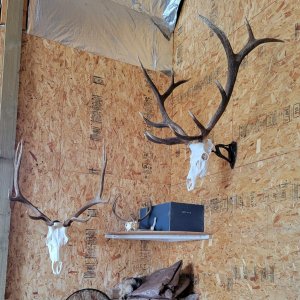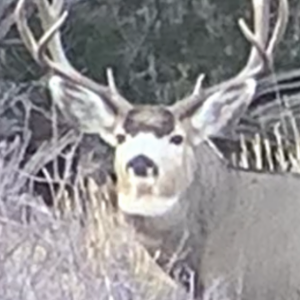You are using an out of date browser. It may not display this or other websites correctly.
You should upgrade or use an alternative browser.
You should upgrade or use an alternative browser.
Anyone invested in the Iraqi Dinar?
- Thread starter nv_hunter
- Start date
S
ShowThemToMe
Guest
We need more info Abe?
[font color=red size=redsize=18"face"]SHOW THEM TO ME![/font]
If You Love Your Country,SHOW THEM TO ME!
Hot Dog,Hot Damn,I love this Ameri-can
[font color=red size=redsize=18"face"]SHOW THEM TO ME![/font]
If You Love Your Country,SHOW THEM TO ME!
Hot Dog,Hot Damn,I love this Ameri-can
From what I understand is that the Dinar value was destroyed when Husein was in power. It went from being worth about 3 to 1 us dollar to .0007 to 1 us dollar today. The investors are buying them now as well as all our boys coming home from Iraq as investment. The rumor is that the NEW Iraqi government is going to revalue their currency. The expected value is estimated to be close to the U.S Dollar or better. From what I have read it seams to be a realistic investment. I don't think I would sell the house to buy Dinar but buying a few hundred could result in hundreds of thousands if they do revalue.


I have a Million of it. Not sure what I am going to do with it. Bought it 2 years ago. Thinking about selling it. One of my buddies brothers works for a group that is very very well tied into gov agency knowledge and his words were "its an interesting investment, lotto ticket no, but it should revalue within 10 yrs. " I dont think it will revalue at 1:1, but cents on the dollars would pay. I can get alot of use out of a thousand dollars rifle in the next ten years.
Cornhusker
Long Time Member
- Messages
- 3,899
Good luck on that. The government of Iraq is so stable I would have great confidence in it. I thought the same thing about some penny stocks about 20 years ago their worth less now than back then. Hope it works for you.
D
D13er
Guest
S
ShowThemToMe
Guest
Looks like to me you can buy 25,000,000 Dinar right now for 27,750.00!
But they're only worth 20,000.00 right now!
Did anybody notice what kind of money Sadamn Insane was packin when they caught him in the Gopher Hole?
[font color=red size=redsize=18"face"]SHOW THEM TO ME![/font]
If You Love Your Country,SHOW THEM TO ME!
Hot Dog,Hot Damn,I love this Ameri-can
But they're only worth 20,000.00 right now!
Did anybody notice what kind of money Sadamn Insane was packin when they caught him in the Gopher Hole?
[font color=red size=redsize=18"face"]SHOW THEM TO ME![/font]
If You Love Your Country,SHOW THEM TO ME!
Hot Dog,Hot Damn,I love this Ameri-can
fireball77
Long Time Member
- Messages
- 3,057
If it sounds to good to be true, it probably is.
http://reviews.ebay.com/Why-NOT-to-invest-in-Iraqi-Dinars?ugid=10000000000872236
A number of people have begun touting so-called "investment" opportunities in the Iraq Dinar as a "sure way" to make a lot of money with little or no risk.Is "investing" in the Iraq Dinar a sure way to profit? I don't think so. In my opinion, buying the Iraq Dinar is a high risk investment with a poor outlook.
A Little History
The official rate of the old Iraq Dinar, $3.22 USD (U.S. Dollars), was set in 1982 by Saddam Hussein. The old Iraq Dinar could not be freely traded, so this rate was never tested or upheld on the world market.
The current Iraq Dinar (IQD) was introduced between October 2003 and January 2004 by the Coalition Provisional Authority in close consultation with financial experts from Iraq and the international community. The IQD is currently valued at a little less than seven hundredths of a US cent. (1 USD = 1460 IQD). The old "Saddam" Dinar has no current value and is worth only what a collector is willing to pay for it.
What's Happening Now?
The IQD is not freely traded, and is not being used in any significant international transactions. It is very doubtful that any official bank or foreign exchange office outside of the middle east will exchange the IQD.
The IQD trades on a very small, tightly controlled exchange. The total volume of IQD traded by the Central Bank of Iraq is in the thousands of dollars, compared to the $1,900 billion dollars traded on the Foreign exchange market every day. This small number of trades makes the IQD's value effectively immaterial.
The Central Bank of Iraq's stated objective is not to promote the free trade of IQD, as is the case in a true free market economy, but rather to keep the value of the IQD stable. The only way the Bank can ensure the semblance of stability is by tightly controlling the exchange of IQD on the market, and by ensuring that the currency cannot freely trade on the open market. They evidently fear that open trading of the IQD would lead to a rout in which the value of the IQD would sink to practically nothing.
Consider the situation. Why tightly control the trading of the IQD if it is likely to appreciate in value? If the value of the IQD were to surge, this could be held out as evidence of a surge of confidence in Iraq's economy. So why not open the IQD to free trading? Why would this be done unless the Iraqi Central Bank itself feels that the IQD would decline in value in a free market?
A Snapshot of Iraq Today
The current situation in Iraq is pretty grim:
Over a decade of international economic sanctions and a devastating war has left the infrastructure in tatters
$125 billion of external debt
Millions of dollars in post-war debt
No stable government
Insurgency steadily on the rise
Oil facilities and pipelines are sabotaged regularly
Many (including the former Prime Minister of Iraq) predict out-and-out civil war
These aren't the kind of conditions typically conducive to the creation of booming economies. More to the point -- a 450,000% increase in the value of the IQD (as predicted by some of its promoters) seems ridiculous in the face of these challenges.
But Surely There's Oil Under Those Dunes?
A lot of the hype over the IQD centers around Iraq's vast oil reserves and their supposed economic value. The oil market is extremely unpredictable. An economy based on oil alone (oil makes up 95% of Iraq's foreign exchange earnings), will mirror that unpredictability. Let's look at a real-world example: Venezuela.
Oil accounts for 80% of Venezuela's national exports and 50% of its government revenues. The country is one of the world's top five oil producers. In the last four years, Venezuela has experienced intense political instability, including an oil strike and an attempted coup d'?tat. The resulting economic chaos has led to the extreme devaluation of the Venezuelan Bolivar -- today, it is worth only about a third of its US Dollar value from January 2000, and only about a quarter of its Euro value from January 2000.
Investing in a country's currency is tantamount to investing in that country's economy as a whole, not in any single commodity. Investing in the Iraq Dinar is not the same as investing in Iraq's oil.
But What About Kuwait?
Promoters of the IQD like to compare Iraq now to post-Gulf War Kuwait -- but this is comparing apples to oranges.
Before the Gulf War, Kuwait had a stable government and its foreign investments generated more income for its economy than its oil did. After the war, despite losing a third of its pre-war investment portfolio (over $100 billion USD), Kuwait still had a solvent economy, a stable government, and an intact infrastructure. Of course its currency increased.
In comparison, Iraq entered the war with a $125 billion USD debt, has almost no infrastructure, no stable government, and no other foreign income except its oil -- the vulnerability and unpredictability of which we have already pointed out. The outlook for its economy and the IQD is grim for the foreseeable future.
In late 2004, the US was successful in convincing some foreign creditors to "forgive" some of Iraq's debt. However, debt forgiveness is seldom a blessing, and generally comes at a very heavy price. Other countries whose foreign debts have been "forgiven" have found it nearly impossible to generate any foreign investment afterwards. Think about it: how would you feel about investing in Iraq again if you lost your entire investment (i.e. you "forgave" it) last time?
If it Sounds Too Good to be True...
Ask yourself one question: if the Iraq Dinar is such a hot commodity, why would anyone in the know be willing to sell it to you? If you thought that the IQD was going to multiply in worth by hundreds of thousands of percent, would you sell it? Of course not -- you'd be too busy buying as much of it as you could.
But if you thought that the IQD was going to go down in value over time, well, then you might start trying to convince people that it was a "great deal" so that you could get rid of all of yours before it nose dives.
Remember the old saying: if it sounds too good to be true, it probably is. Be careful!
Updated: 16 July 2006.
It has been mentioned in certain circles that once Iraq has finally rid itself of the US presence, Iraq may cease to use the current Provisional Currency that has been sold in bulk all over the world and develop its own currency(s), therefore rendering all Provisional Dinars worthless. That is only "opinion" on one possible scenario.
http://reviews.ebay.com/Why-NOT-to-invest-in-Iraqi-Dinars?ugid=10000000000872236
A number of people have begun touting so-called "investment" opportunities in the Iraq Dinar as a "sure way" to make a lot of money with little or no risk.Is "investing" in the Iraq Dinar a sure way to profit? I don't think so. In my opinion, buying the Iraq Dinar is a high risk investment with a poor outlook.
A Little History
The official rate of the old Iraq Dinar, $3.22 USD (U.S. Dollars), was set in 1982 by Saddam Hussein. The old Iraq Dinar could not be freely traded, so this rate was never tested or upheld on the world market.
The current Iraq Dinar (IQD) was introduced between October 2003 and January 2004 by the Coalition Provisional Authority in close consultation with financial experts from Iraq and the international community. The IQD is currently valued at a little less than seven hundredths of a US cent. (1 USD = 1460 IQD). The old "Saddam" Dinar has no current value and is worth only what a collector is willing to pay for it.
What's Happening Now?
The IQD is not freely traded, and is not being used in any significant international transactions. It is very doubtful that any official bank or foreign exchange office outside of the middle east will exchange the IQD.
The IQD trades on a very small, tightly controlled exchange. The total volume of IQD traded by the Central Bank of Iraq is in the thousands of dollars, compared to the $1,900 billion dollars traded on the Foreign exchange market every day. This small number of trades makes the IQD's value effectively immaterial.
The Central Bank of Iraq's stated objective is not to promote the free trade of IQD, as is the case in a true free market economy, but rather to keep the value of the IQD stable. The only way the Bank can ensure the semblance of stability is by tightly controlling the exchange of IQD on the market, and by ensuring that the currency cannot freely trade on the open market. They evidently fear that open trading of the IQD would lead to a rout in which the value of the IQD would sink to practically nothing.
Consider the situation. Why tightly control the trading of the IQD if it is likely to appreciate in value? If the value of the IQD were to surge, this could be held out as evidence of a surge of confidence in Iraq's economy. So why not open the IQD to free trading? Why would this be done unless the Iraqi Central Bank itself feels that the IQD would decline in value in a free market?
A Snapshot of Iraq Today
The current situation in Iraq is pretty grim:
Over a decade of international economic sanctions and a devastating war has left the infrastructure in tatters
$125 billion of external debt
Millions of dollars in post-war debt
No stable government
Insurgency steadily on the rise
Oil facilities and pipelines are sabotaged regularly
Many (including the former Prime Minister of Iraq) predict out-and-out civil war
These aren't the kind of conditions typically conducive to the creation of booming economies. More to the point -- a 450,000% increase in the value of the IQD (as predicted by some of its promoters) seems ridiculous in the face of these challenges.
But Surely There's Oil Under Those Dunes?
A lot of the hype over the IQD centers around Iraq's vast oil reserves and their supposed economic value. The oil market is extremely unpredictable. An economy based on oil alone (oil makes up 95% of Iraq's foreign exchange earnings), will mirror that unpredictability. Let's look at a real-world example: Venezuela.
Oil accounts for 80% of Venezuela's national exports and 50% of its government revenues. The country is one of the world's top five oil producers. In the last four years, Venezuela has experienced intense political instability, including an oil strike and an attempted coup d'?tat. The resulting economic chaos has led to the extreme devaluation of the Venezuelan Bolivar -- today, it is worth only about a third of its US Dollar value from January 2000, and only about a quarter of its Euro value from January 2000.
Investing in a country's currency is tantamount to investing in that country's economy as a whole, not in any single commodity. Investing in the Iraq Dinar is not the same as investing in Iraq's oil.
But What About Kuwait?
Promoters of the IQD like to compare Iraq now to post-Gulf War Kuwait -- but this is comparing apples to oranges.
Before the Gulf War, Kuwait had a stable government and its foreign investments generated more income for its economy than its oil did. After the war, despite losing a third of its pre-war investment portfolio (over $100 billion USD), Kuwait still had a solvent economy, a stable government, and an intact infrastructure. Of course its currency increased.
In comparison, Iraq entered the war with a $125 billion USD debt, has almost no infrastructure, no stable government, and no other foreign income except its oil -- the vulnerability and unpredictability of which we have already pointed out. The outlook for its economy and the IQD is grim for the foreseeable future.
In late 2004, the US was successful in convincing some foreign creditors to "forgive" some of Iraq's debt. However, debt forgiveness is seldom a blessing, and generally comes at a very heavy price. Other countries whose foreign debts have been "forgiven" have found it nearly impossible to generate any foreign investment afterwards. Think about it: how would you feel about investing in Iraq again if you lost your entire investment (i.e. you "forgave" it) last time?
If it Sounds Too Good to be True...
Ask yourself one question: if the Iraq Dinar is such a hot commodity, why would anyone in the know be willing to sell it to you? If you thought that the IQD was going to multiply in worth by hundreds of thousands of percent, would you sell it? Of course not -- you'd be too busy buying as much of it as you could.
But if you thought that the IQD was going to go down in value over time, well, then you might start trying to convince people that it was a "great deal" so that you could get rid of all of yours before it nose dives.
Remember the old saying: if it sounds too good to be true, it probably is. Be careful!
Updated: 16 July 2006.
It has been mentioned in certain circles that once Iraq has finally rid itself of the US presence, Iraq may cease to use the current Provisional Currency that has been sold in bulk all over the world and develop its own currency(s), therefore rendering all Provisional Dinars worthless. That is only "opinion" on one possible scenario.
"It has been mentioned in certain circles that once Iraq has finally rid itself of the US presence, Iraq may cease to use the current Provisional Currency that has been sold in bulk all over the world and develop its own currency(s), therefore rendering all Provisional Dinars worthless. That is only "opinion" on one possible scenario."
As a retired soldier, I wholeheartedly agree with this last paragraph.
Another scenario to ponder is the Iraqi Dinar being taken over by Iran. Yup, they will get their nukes and possibly be nooked by shh,, (israel),,
To risky of an investment right now. Personally I think they will throw out the existing currency and print their own.
As a retired soldier, I wholeheartedly agree with this last paragraph.
Another scenario to ponder is the Iraqi Dinar being taken over by Iran. Yup, they will get their nukes and possibly be nooked by shh,, (israel),,
To risky of an investment right now. Personally I think they will throw out the existing currency and print their own.
Gator
Long Time Member
- Messages
- 18,161
I believe RED said it best with this here sentence:
Ask yourself one question: if the Iraq Dinar is such a hot commodity, why would anyone in the know be willing to sell it to you? If you thought that the IQD was going to multiply in worth by hundreds of thousands of percent, would you sell it? Of course not -- you'd be too busy buying as much of it as you could.
But if you thought that the IQD was going to go down in value over time, well, then you might start trying to convince people that it was a "great deal" so that you could get rid of all of yours before it nose dives.
"I have found if you go the extra mile it's Never crowded".
>[Font][Font color = "green"]Life member of
>the MM green signature club.[font/]
Ask yourself one question: if the Iraq Dinar is such a hot commodity, why would anyone in the know be willing to sell it to you? If you thought that the IQD was going to multiply in worth by hundreds of thousands of percent, would you sell it? Of course not -- you'd be too busy buying as much of it as you could.
But if you thought that the IQD was going to go down in value over time, well, then you might start trying to convince people that it was a "great deal" so that you could get rid of all of yours before it nose dives.
"I have found if you go the extra mile it's Never crowded".
>[Font][Font color = "green"]Life member of
>the MM green signature club.[font/]
S
ShowThemToMe
Guest
Dang it Red!
I was gonna become a Millionaire!
You know!
A Dinar Millionaire!
[font color=red size=redsize=18"face"]SHOW THEM TO ME![/font]
If You Love Your Country,SHOW THEM TO ME!
Hot Dog,Hot Damn,I love this Ameri-can
I was gonna become a Millionaire!
You know!
A Dinar Millionaire!
[font color=red size=redsize=18"face"]SHOW THEM TO ME![/font]
If You Love Your Country,SHOW THEM TO ME!
Hot Dog,Hot Damn,I love this Ameri-can
W
westelkman
Guest
Dang, I hope you are joking. I look back on the investments I didn't fully understand and got my Azz handed to me on most.
How can one begin to understand a foreign country in flux with evolving theologies and on top of everything else, its currency, which is the riskiest trade on earth.
Currencies; One only has to look at the recent "sure thing" going short the Euro......hmmmm back up from $1.26 to $1.32- what happened!? With everyone and his brother shorting the crap out of it. Perfect example of a crowded trade with tons of short covering. These trades are akin to musical chairs- if you aren't following closely, by the time you hear of it its too late.
How can one begin to understand a foreign country in flux with evolving theologies and on top of everything else, its currency, which is the riskiest trade on earth.
Currencies; One only has to look at the recent "sure thing" going short the Euro......hmmmm back up from $1.26 to $1.32- what happened!? With everyone and his brother shorting the crap out of it. Perfect example of a crowded trade with tons of short covering. These trades are akin to musical chairs- if you aren't following closely, by the time you hear of it its too late.
S
ShowThemToMe
Guest
I just proved Once again I'm a Piss Poor Investor!
[font color=red size=redsize=18"face"]SHOW THEM TO ME![/font]
If You Love Your Country,SHOW THEM TO ME!
Hot Dog,Hot Damn,I love this Ameri-can
[font color=red size=redsize=18"face"]SHOW THEM TO ME![/font]
If You Love Your Country,SHOW THEM TO ME!
Hot Dog,Hot Damn,I love this Ameri-can






